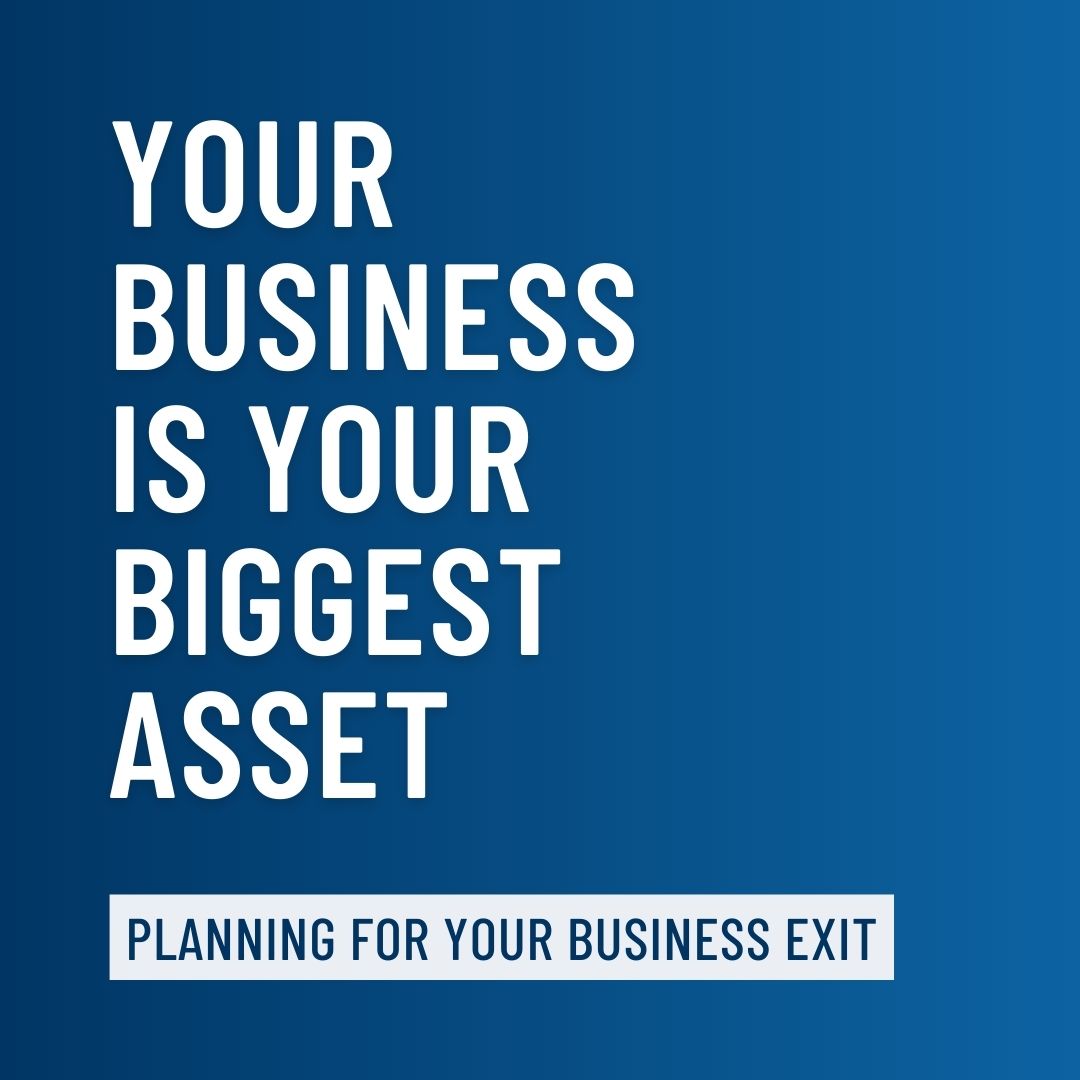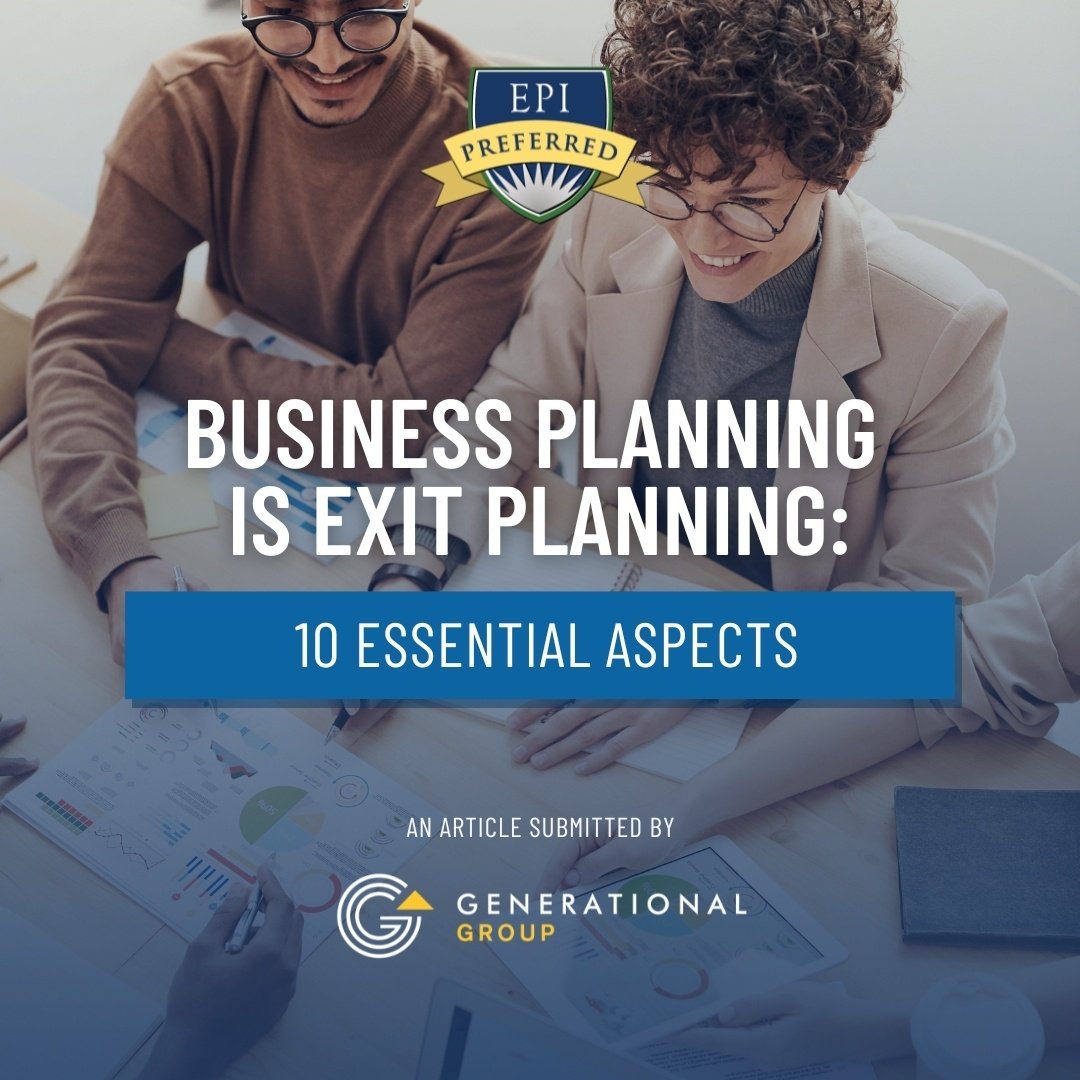
THE EXIT PLANNING BLOG
Keep up-to-date with exit planning, succession planning, industry trends, unique specialty insights, and useful content for professional advisors and business owners.
Share this
Your Business is Your Biggest Asset - Planning for Your Business Exit
by Colleen Kowalski on April 26, 2023

As a business owner, 80% of your overall wealth is likely locked inside your business. This means your business is the most significant asset you control.
With that in mind, how do you ensure you earn the most during your business exit?
We spoke with Liam O’Shea, Director of Training and Success at ValuCompass to learn more about how his company helps owners plan for a significant exit from their business.
Meet Liam O’Shea
Liam O’Shea is the Director of Training & Success at ValuCompass. Through training and coaching, Liam helps advisors and consultants integrate the ValuCompass tools into their practice to enhance their engagements with business owners. Prior to ValuCompass, Liam worked at Commonwealth Financial Network as a consultant to financial advisors, helping advisors with growth planning, client segmentation, and succession planning. Liam lives in Ashland, MA with his wife and two young sons.
More about ValuCompass
ValuCompass empowers advisors and consultants to help business owners understand their business as an asset and integrate the owner’s business and personal planning. With 40 years of research and over 50,000 businesses analyzed, ValuCompass provides powerful analytics to help owners gain insights into their businesses and develop an integrated business and personal plan. Their suite of analytical assessments and reports helps advisors have more efficient and effective conversations with owners, delivering value and highlighting needs early in the process, setting the stage for long-term, valuable engagements.
Liam shares, “ValuCompass changes how advisors work with business owners by providing tools that are quick and easy to use for both the owner and the advisor, increasing buy-in from clients and accelerating engagements.”
ValuCompass provides assessment tools to clients that are both efficient and maintain a high standard of analytical power. These allow advisors to deliver results to an owner quickly without long meetings and data collection. Liam explains, “While we understand the value of 100+ question, multi-hour assessments to evaluate a business, owners can be more hesitant to commit to these processes up front and advisors have a more difficult time integrating these tools into their existing service model.”
An owner’s business is likely their largest asset. What do you recommend owners consider when planning for their exit from their business?
Liam: In the world of financial planning and wealth management, we do a very good job of helping clients understand some key benefits of their personal assets. If we think about the four primary asset classes – cash, fixed income, equities, and real assets – clients generally understand five key areas:
- The income these personal assets can produce
- The value of these assets
- The current and future financial benefits of those assets
- How these assets connect to their personal financial goals
- The marketability of these assets
However, when it comes to the owner’s largest assets – their business – they generally only understand the income that the asset can produce. In the 2022 Business Owner Perspectives Study conducted by MassMutual, 52% of owners said that, other than the income generated they don’t think about how their business and personal financial well-being are related.
Business owners must begin to view their business assets the same way that they view their personal assets. They need to have a true understanding of the value of the asset and the marketability – how will they receive the value and what does the market really look like? They also need to connect their business assets to their personal planning and truly understand the future financial benefit that the business can provide to them personally. By viewing the business this way, they can better understand how today’s decisions will impact themselves and their families in the future. It can also set the stage for more exit options and allow the owner to select the option most desirable to them.
How does personal planning impact the overall success of a business transition?
Liam: Personal planning is crucial to successfully transitioning the business the way the owner wants. It is important for business owners to understand how their business assets will impact their personal financial planning well ahead of their planned business transition.
The reason is that each transition option provides a different level of financial benefit to the owner. The total value the owner receives, when they receive that value, and their role in the transition will all depend on the transition option they choose. If an owner has not done the necessary personal planning, when they go to transition their business, they may find that the transition option they desire does not provide them the financial benefit they need to achieve their personal goals. Further, if they have not done the appropriate personal planning, their family may be left in financial distress in the event of an unplanned exit.
What are the top three things you would tell owners when planning for their life after their business?
Liam:
Be detailed in planning how you will spend your time.
Spending time with grandchildren, playing more golf, or working on your garden are all admirable activities. However, those collectively do not make up for all of the hours you spent in your business on a daily basis. How will you spend the time you used to spend in your business? How will you feel fulfilled as a person when you no longer get fulfillment from your business? Getting detailed in your planning will force you to address these issues before you get to the closing table.
Have a very clear understanding of the money you will need to achieve the retirement you want.
Owners benefit from being able to put personal expenses through the business. The issue here is that it can distort their understanding of what they truly spend. Getting clear on what retirement looks like for you and what it will cost will help you fully understand the value you need to get from the business.
Talk to family and friends about your plans after the business.
Seek advice from those that have gone through similar transitions. All transitions are hard but it is likely that you have people close to you that have gone through them. Be open about your plans, your questions, and your fears so that by the time you reach the point of transition you feel good about the next stage.
EPI talks extensively about the Three Gaps business owners should be aware of: the Profit, Value, and Wealth Gaps. What is the benefit of closing these gaps?
Liam: The three gaps discussed here – the Profit, Value, and Wealth Gaps – are all interrelated and lead to a successful transition for the business owner. Closing the Profit Gap (EBITDA) increases business value and closes the Value Gap and it also provides more cash for the owner to build up personal assets to become less reliant on the business for retirement (Wealth Gap).
The Profit Gap is the profit a business is leaving on the table by not operating as efficiently as it can. Closing the Profit Gap requires working to improve the internal workings of the business so that you can create more profit at current levels of revenue. By doing so, you will now have more cash on the bottom line. This cash can be taken by the owner and used to increase their personal assets outside of the business. Or, it can be used to invest in the business further increasing revenue and business value.
The Wealth Gap is the difference between the amount an owner needs in retirement and the value of the business today. To close the Wealth Gap, owners much build up assets and income outside of the business in order to become less reliant on the business as an asset to achieve a successful retirement. The less reliant an owner is on the business asset to fund their retirement, the more options they have when they go to exit. For example, if the owner wishes to transition their business to key employees, they will likely sell the business at a discount and receive payment over time rather than in a lump sum. However, if they have not closed their Wealth Gap sufficiently, they may not be able to afford that deal structure and therefore may need to select a different exit option that is less desirable to the owner and their key employees.
The Value Gap is the difference between the potential value of the business and the actual value of the business today. To close this gap, the owner can improve the internal workings of the business which will close the Profit Gap and generate more cash to invest in the business. In turn, improved efficiency can lead to greater revenue, compounding the impact on business value. Closing the Value Gap will help close the Wealth Gap by providing greater future financial benefits to the owner.
Share this
- Blog (548)
- CEPA (431)
- exit planning (249)
- CEPA community (188)
- Business Owner (175)
- Exit Planning Summit (99)
- EPI Chapter Network (89)
- Value Acceleration Methodology (81)
- Exit Planning Partner Network (76)
- EPI Announcement (50)
- Content (48)
- Webinars (37)
- Excellence in Exit Planning Awards (34)
- Marketing (30)
- 2024 Exit Planning Summit (28)
- 5 Stages of Value Maturity (26)
- Books (24)
- EPI Academy (24)
- EPI Team (22)
- Exit Planning Teams (22)
- Leadership (21)
- 2023 Exit Planning Summit (20)
- family business (20)
- women in business (19)
- Intangible Capital (18)
- Exit Options (17)
- Black Friday (16)
- CPA (15)
- Walking to Destiny (15)
- Chapters (14)
- State of Owner Readiness (14)
- charitable intent (13)
- Chris Snider (12)
- National Accounts (12)
- Small business (12)
- personal planning (12)
- Financial Advisors (11)
- Season of Deals (9)
- 5 Ds (8)
- About us (8)
- Podcast (8)
- Scott Snider (8)
- Insiders Bash (7)
- Christmas (6)
- Exit Planning Content Library (6)
- Case Studies (5)
- Owner Roundtables (5)
- Three Legs of the Stool (5)
- Value Advisors (5)
- financial planning (5)
- Awards (4)
- Circle of Excellence (4)
- EPI Thought Leadership Council (4)
- Exit & Succession (4)
- Five Ds (4)
- executive training (4)
- DriveValue (3)
- Owners Forum (3)
- author (3)
- forbes (3)
- Exit Is Now Podcast (2)
- Peter Christman (2)
- Veteran (2)
- Whitepapers (2)
- Annual Exit (1)
- Business Owners Forum (1)
- SOOR (1)
- business consultants (1)






